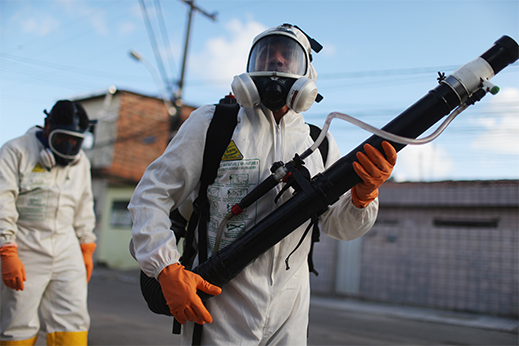Halting the explosive spread of Zika means waging war with mosquitoes. There are several ways, old and new, to win that war.

The Zika virus is out of control. Earlier this week, the World Health Organization called it an “explosive” epidemic, and officials in Brazil, the country hardest hit by the disease, have admitted that they are “losing badly” to the disease. Brazilian president Dilma Rousseff went so far as to declare war on Aedes aegypti, the mosquito that transmits Zika. Officials in several other countries in the region have asked women to consider not getting pregnant until the epidemic is brought under control.
The good news is this: we know how to fight mosquitoes, and our arsenal is growing bigger by the day. In her declaration, Rousseff said she will dispatch over 200,000 troops throughout Brazil to enact tried and tested methods of combatting mosquito populations. That includes spraying insecticides, eliminating pools of standing water, and educating the public. These methods work: in 1942 Brazil undertook a campaign to eradicate A. aegypti across the country, largely in response to yellow fever. Countries throughout South America, Central America, and the Caribbean joined in, as did the Rockefeller Foundation in the U.S., and by 1962 Brazil and 17 other countries were free of the mosquitoes.
But such methods also take time, and time is not on our side for fighting a disease that has spread as far as it has despite only arriving in the Western hemisphere in 2014. As the situation worsens, several technological approaches may start to look appealing.
The first is rather mundane: cell phones. Cell phones are useful because they record the movements of their owners. That data can be used to track disease hot spots and predict where they may flare up next. The technique has already been employed in Africa in the battle against malaria and in Pakistan against dengue fever—both mosquito-borne diseases like Zika.
Genetically modified mosquitoes could also have a role to play. Successful tests in the Cayman Islands and Brazil have shown that the introduction of modified male mosquitoes can cause local populations to crash. But these tests, conducted by the British firm Oxitec, have so far been on the scale of a few neighborhoods. Ramping up the process to cover all of Brazil would require a huge logistical effort to grow and distribute the modified insects.
Then there is the gene drive. This newly developed technology involves inserting genes into an organism in such a way that a trait spreads throughout a whole population. In theory, a gene drive could be created that prevents mosquitoes from incubating Zika virus—or destroys the entire species of A. aegypti. A gene drive has been created that prevents mosquitoes from harboring the malaria parasite. But some researchers are understandably concerned about intentionally messing with natural selection. Once a drive is released into a wild population, there is no turning back, and there is no telling what sort of side effects it might have....MORE